The Cherokee are one of the indigenous people of the Southeastern Woodlands of the United States. Prior to the 18th century, they were concentrated in what is now southwestern North Carolina, southeastern Tennessee, edges of western South Carolina, northeastern Georgia and northeastern Alabama.
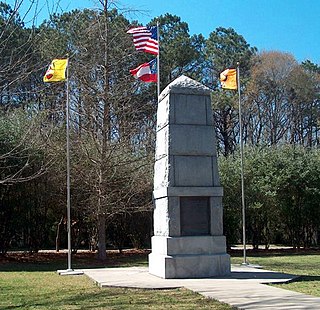
The Trail of Tears was a series of forced relocations of approximately 60,000 Native Americans between 1830 and 1850 by the United States government. Members of the Cherokee, Muscogee (Creek), Seminole, Chickasaw, and Choctaw nations were forcibly removed from their ancestral homelands in the Southeastern United States to areas to the west of the Mississippi River that had been designated as 'Indian Territory'. The forced relocations were carried out by government authorities following the passage of the Indian Removal Act in 1830. The Cherokee removal in 1838 was brought on by the discovery of gold near Dahlonega, Georgia in 1828, resulting in the Georgia Gold Rush.
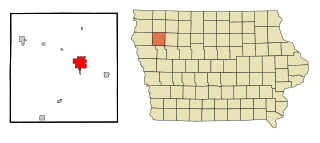
Cherokee is a city in Cherokee County, Iowa, United States. The population was 5,253 at the 2010 Census, down from 5,369 in 2000. It is the county seat of Cherokee County.

Webbers Falls is a town in southeastern Muskogee County, Oklahoma, United States. The population was 616 at the 2010 census, a decline of 14.9 percent from 724 at the 2000 census.

Stand Watie, also known as Standhope Uwatie, Tawkertawker, and Isaac S. Watie, was a leader of the Cherokee Nation. The nation allied with the Confederacy, and he was the only Native American to attain a general's rank in the Civil War, Confederacy or Union. He commanded the Confederate Indian cavalry of the Army of the Trans-Mississippi, made up mostly of Cherokee, Muskogee and Seminole. He was the last Confederate general in the field to cease hostilities at war's end.
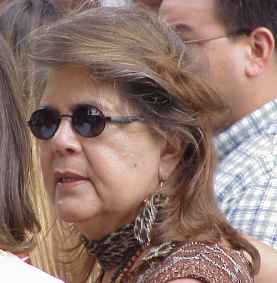
Wilma Pearl Mankiller was a Cherokee activist, social worker, community developer and the first woman elected to serve as Principal Chief of the Cherokee Nation. Born in Tahlequah, Oklahoma, she lived on her family's allotment in Adair County, Oklahoma, until the age of 11, when her family relocated to San Francisco as part of a federal government program to urbanize Native Americans. After high school, she married a well-to-do Ecuadorian and raised two daughters. Inspired by the social and political movements of the 1960s, Mankiller became involved in the Occupation of Alcatraz and later participated in the land and compensation struggles with the Pit River Tribe. For five years in the early 1970s, she was employed as a social worker, focusing mainly on children's issues.

The Cherokee Outlet, or Cherokee Strip, was located in what is now the state of Oklahoma in the United States. It was a sixty-mile (97 km) wide parcel of land south of the Oklahoma-Kansas border between the 96th and 100th meridians. The Cherokee Outlet was created in 1836. The United States forced the Cherokee Nation of Indians to cede to the United States all lands east of the Mississippi River in exchange for a reservation and an "outlet" in Indian Territory. At the time of its creation, the Cherokee Outlet was about 225 miles (360 km) long. The cities of Enid, Woodward, and Ponca City would later be founded within the boundaries of what had been the Cherokee Outlet.

The Eastern Band of Cherokee Indians (EBCI), is a federally recognized Indian Tribe in the United States, who are descended from the small group of 800 Cherokee who remained in the Eastern United States after the Indian Removal Act moved the other 15,000 Cherokee to the west in the 19th century. They were required to assimilate and renounce tribal Cherokee citizenship.

The Anglo–Cherokee War, was also known from the Anglo-European perspective as the Cherokee War, the Cherokee Uprising, or the Cherokee Rebellion. The war was a conflict between British forces in North America and Cherokee Indian tribes during the French and Indian War. The British and the Cherokee had been allies at the start of the war, but each party had suspected the other of betrayals. Tensions between British-American settlers and the Cherokee increased during the 1750s, culminating in open hostilities in 1758.

Gary Paul Davis, known professionally as Litefoot, is an American business professional, actor, musician, and a citizen of the Cherokee Nation. He is the Executive Director of the Native American Financial Services Association (NAFSA), CEO of Davis Strategy Group and a member of the Forbes Finance Council. As an actor, he is known for his roles as Little Bear in the movie The Indian in the Cupboard, and Nightwolf in Mortal Kombat Annihilation.
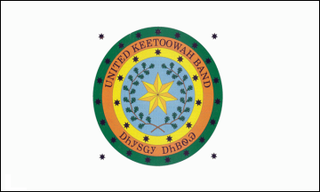
The United Keetoowah Band of Cherokee Indians in Oklahoma is a federally recognized tribe of Cherokee Native Americans headquartered in Tahlequah, Oklahoma. According to the UKB website, its members are mostly descendants of "Old Settlers" or "Western Cherokee," those Cherokee who migrated from the Southeast to present-day Arkansas and Oklahoma about 1817. Some reports estimate that Old Settlers began migrating west by 1800. This was before the forced relocation of Cherokee by the United States in the late 1830s under the Indian Removal Act.

Wesley Studi is a Cherokee American actor and film producer who has won critical acclaim and awards, particularly for his portrayal of Native Americans in film. He has appeared in Academy Award-winning films, such as Dances with Wolves (1990) and The Last of the Mohicans (1992), and in the Academy Award-nominated films Geronimo: An American Legend (1993) and The New World (2005). He is also known for portraying Sagat in Street Fighter (1994). Other films he has appeared in are Hostiles, Heat, Mystery Men, Avatar, A Million Ways to Die in the West, and the television series Penny Dreadful. In 2020, he received an Academy Honorary Award, becoming the first Native American and the second North American Indigenous person to be honored by the Academy.
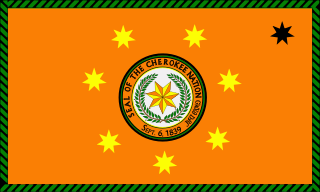
The Cherokee Nation, also known as the Cherokee Nation of Oklahoma, is the largest of three Cherokee federally recognized tribes in the United States. It was established in the 20th century and includes people descended from members of the Old Cherokee Nation who relocated, due to increasing pressure, from the Southeast to Indian Territory and Cherokee who were forced to relocate on the Trail of Tears. The tribe also includes descendants of Cherokee Freedmen, Absentee Shawnee, and Natchez Nation. Over 299,862 people are enrolled in the Cherokee Nation, with 189,228 living within the state of Oklahoma. In 2009 Larry Echo Hawk, former head of the Bureau of Indian Affairs (BIA), said the current Cherokee Nation is not the historical Cherokee tribe but instead a "successor in interest" which was rejected by the Cherokee Nation. In 2010, Larry Echo Hawk withdrew his previous statement regarding "successor in interest".

The Land Run of 1893, also known as the Cherokee Outlet Opening or the Cherokee Strip Land Run, marked the opening to settlement of the Cherokee Outlet in Oklahoma's fourth and largest land run. It was part of what would later become the U.S. state of Oklahoma in 1907.
The Trail of Tears: Cherokee Legacy is a 2006 documentary by Rich-Heape Films. It presents the history of the forcible removal and relocation of Cherokee people from southeastern states of the United States to territories west of the Mississippi River, particularly to the Indian Territory in the future Oklahoma.
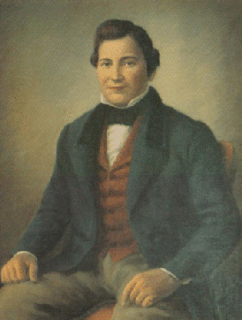
Joseph H. Vann was a Cherokee leader of mixed-race ancestry, a businessman and planter in Georgia, Tennessee and Indian Territory. He owned plantations, many slaves, taverns, and steamboats. In 1837, he moved with several hundred Cherokee to Indian Territory, as he realized they had no choice under the government's Indian Removal policy. He built up his businesses along the major waterways, operating his steamboats on the Tennessee, Ohio, Mississippi, and Arkansas rivers.
The 1842 Slave Revolt in the Cherokee Nation was the largest escape of a group of slaves to occur in the Cherokee Nation, in what was then Indian Territory. The slave revolt started on November 15, 1842, when a group of 20 African-American slaves owned by the Cherokee escaped and tried to reach Mexico, where slavery had been abolished in 1829. Along their way south, they were joined by 15 slaves escaping from the Creek Nation in Indian Territory.

Cherokee Preservation Foundation is an independent nonprofit foundation established in 2000 as part of the Tribal-State Compact amendment between the Eastern Band of Cherokee Indians (EBCI) and the State of North Carolina. The Foundation is funded by the EBCI from gaming revenues generated by the Tribe; it is not associated with any for-profit gaming entity and is a separately functioning organization independent of the Tribal government. It works to improve the quality of life of the EBCI and strengthen the western North Carolina region by balancing Cherokee ways with the pursuit of new opportunities. The Foundation focuses on cultural preservation, economic development, job creation, and environmental preservation and is an engine for rural community development on the Qualla Boundary and the surrounding Haywood, Jackson, Clay, Macon, Graham, Swain and Cherokee counties.
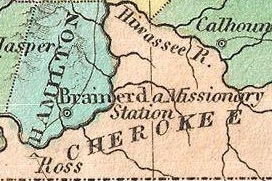
Cherokee removal, part of the Trail of Tears, refers to the forced relocation between 1836 and 1839 of an estimated 16,000 members of the [[Cherokee]Nation] and 1,000-2,000 of their slaves; from their lands in Georgia, South Carolina, North Carolina, Tennessee, and Alabama to the Indian Territory in the then Western United States, and the resultant deaths along the way and at the end of the movement of an estimated 4,000 Cherokee and unknown number of slaves.
Our Spirits Don't Speak English (2008) is a documentary film about Native American boarding schools attended by young people mostly from the mid-19th to the mid-20th centuries. It was filmed by the Rich Heape company and directed by Chip Richie. Native American storyteller Gayle Ross narrated the film. Ross is a descendant of John Ross, chief of the Cherokee Nation in the Trail of Tears period.














